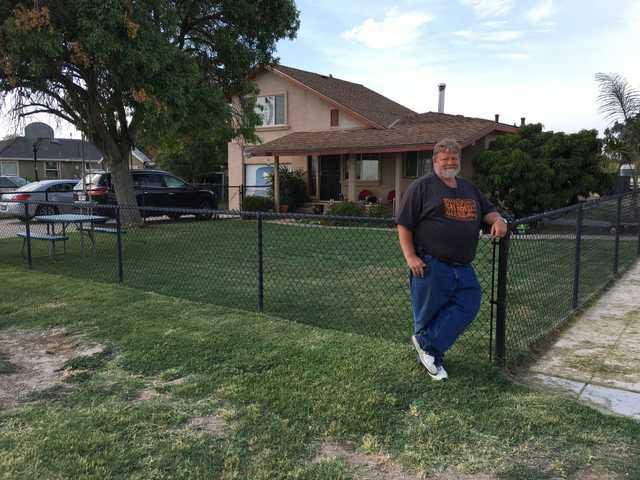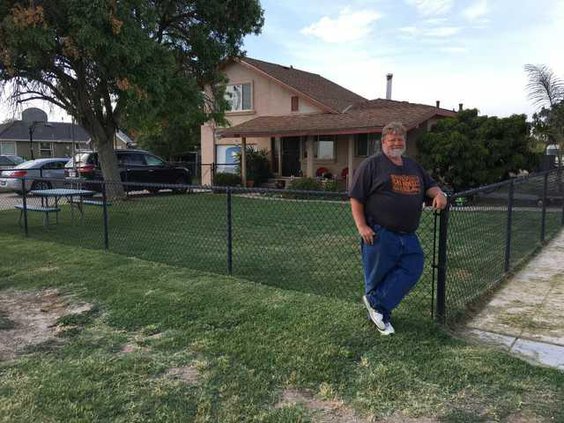The City of Manteca is taking Eric and Jeanette Hayes’ home one way or another.
The place where the couple has raised a family and called home for 35 years is needed so freeway ramps can be built allowing future guests of an indoor waterpark resort to access McKinley Avenue from the 120 Bypass.
They understand that they can’t stop progress.
And while they don’t want to move, they would like to be treated fairly.
The Hayes reside on Bronzan Road on just under an acre. They have a home originally built in 1921 that they have expanded, remodeled, and upgraded with touches such as granite counter tops in the kitchen and hardwood kitchen cabinets. The home has 1,833 square feet of living space, a swimming pool with hot tub, a 1,600-square-foot garage with a 25-foot high roof line, a pole-mounted solar system that wipes out their power bills, and a number of outbuildings.
The appraiser hired by the city initially told the Hayes their home wasn’t worth more than a 1,732-quare-foot home on Shortland Circle near Woodward Park that is on a lot one fifth the size and lacks a built-in swimming pool and hot tub let alone a 1,600-square-foot garage.
It was presented as a “final offer” deal. They dug in their heels. In countless email exchanges the appraiser makes the case that they aren’t required to assign a replacement value to the property but what they determine is market value.
The Hayes wanted the value based on comparable property, which means a large work garage, a large solar power system mounted on poles, a swimming pool that was put in place by Aqua Pools, and a house that was similar to the one they now live in.
The appraiser came back with comparable property in South Modesto and East Stockton where values typically run 15 to 30 percent lower than Manteca. Another was in Oakdale.
Eric Hayes hit the Internet researching state and federal law that sets parameters for appraisals in his family’s situation where they had to find property that was comparable and within a reasonable distance of his workplace which happens to be a shipyard in San Francisco. The three properties the appraiser picked out would add an hour or more to his daily commute and they cost less than anything in the immediate Manteca area.
After couple insists
city hired consultant was
way off they come up with
a new, higher appraisal
Then the city hired appraiser came back with a new appraisal that was 8 percent higher than the one originally offered. Hayes had his own appraisal done that said the value was at least 10 percent higher.
It is then the appraiser found a property in the Manteca area that was comparable to what the Hayes’ owned but marketed for $275,000 more than the offer made on behalf of the city. The new proposal offered the Hayes would include relocation consideration funds to cover the $275,000 difference. When Hayes pointed out the swimming pool — according to the owner — hadn’t had water in it for two years and had cracks and that the house had a lot of interior issues ranging from carpet that is older than on their home, curling linoleum compared to their tiled floors, and particle board cabinets in the kitchen as opposed to hardwood as well as counters that were several grades below granite, he was told all the government had to do was make sure the home they compared his to was weather proof and livable and not the same quality per se.
“The garage was definitely the same quality,” Hayes said. “But we’d have to put considerable money into the home to make it the same quality as ours. We’re not trying to make a million dollars. We just don’t want to lose money because we are forced to move.”
The appraiser’s response: The property in question’s price reflects the fact the buyer may have to spend additional money to make the pool useable and to make improvements to the house.
As far as Hayes was concerned, that proved his point. If they had to put more money into the property than they receive from the city in order to be at the same standard they now enjoy, they are losing money by being forced to sell.
They’ve been before an administrative hearing officer who was selected by the firm the city hired to appraise the properties they needed to acquire for the interchange.
It didn’t strike the Hayes as being impartial or fair given the appraiser picked the hearing officer.
The hearing officer sided with the appraiser.
“We want to make it clear we have no complaint about the city staff,” Hayes said.
Hayes said at one point they were told by the appraiser they were making the final offer and eminent domain would be next, but in checking with the city they hadn’t authorized eminent domain.
Hayes said some people have suggested he obtain a lawyer. The problem with that, Hayes pointed out, is a lawyer wants cash up front or 30 percent of whatever they would receive in a settlement.
Knowing most people couldn’t afford such a loss to win what would be basically a symbolic victory has Hayes convinced the entire system of government agencies securing properties they want for projects is stacked again the little guy. He pointed to the revised 8 percent higher appraisal as well as the concession that at least another $275,000 beyond what they were offered to secure a similar property that still needs work to make it comparable would end up costing his family money out of pocket.
City said in 2001
interchange work
wouldn’t impact
the Hayes’ home
Contributing to their angst about not being treated fairly was a similar property near the end of Bronzan Road that isn’t in the path of the interchange within the past year closed escrow for $525,000 — significantly more than the basic appraisal the city’s consultant came up with for the their home and land.
“We bought our home here,” Hayes said. “We built our life here. We were going to retire here.”
When they moved into the home 35 years ago there was no talk of an interchange being built at McKinley Avenue.
Then in 2001, when the interchange possibility came up the city assured them that the ramps would be similar to the ones at the Yosemite/Guthmiller interchange a mile to the west on the 120 Bypass. The question came up when Manteca pushed to annex Bronzan Road into the city so large scale development could take place in the area south of the proposed interchange.
Then when plans started advancing for the destination waterpark on city-owned land between the 120 Bypass and the municipal wastewater treatment plant, Caltrans determined the best design for effective and safe traffic flow was a cloverleaf interchange. That would require taking a large chunk of the Hayes’ property.
Adding to their stress was the slow pace of the process that finally has picked up as the city gets ready to seal a deal for a waterpark resort. Without the interchange, whoever ends up locating on the city property can’t build anything larger than a 500-room hotel, 80,000 square foot indoor waterpark or a 30,000 square foot conference center.
Hayes and his neighbors were told in 2014 that they would have offers on their properties within six months. That didn’t happen.
Next door neighbor
had to take first offer
or face significant losses
Meanwhile their next door neighbor who worked for Pilkington Glass in Lathrop lost his job in 2015 when the plant closed. He accepted a job with the company in the Chicago area. Selling their home was problematic given they had to disclose to any potential buyer the city was getting ready to buy the home for an interchange project. That meant they ended up with two mortgages while renting their home at a reduced amount to a family member.
Then two other issues came up. A tornado shut down the glass plant near Chicago for several months cutting off their income and the two-year limitation to avoid capital gains taxes was coming up. So when an offer was made on an appraisal the neighbor was finally given early this year, he felt he had no choice but to take what he believed was a substainally lower price in order to avoid a significant loss of money or possible financial ruin.
“He felt like he was over a barrel,” Hayes said.
Hayes said he understands you can’t stop progress, however it is defined.
“All we want is to be treated fairly,” he said.
To contact Dennis Wyatt, email dwyatt@mantecabulletin.com
PAYING PRICE FOR PROGRESS
Interchange may cost long- time Manteca family dearly



